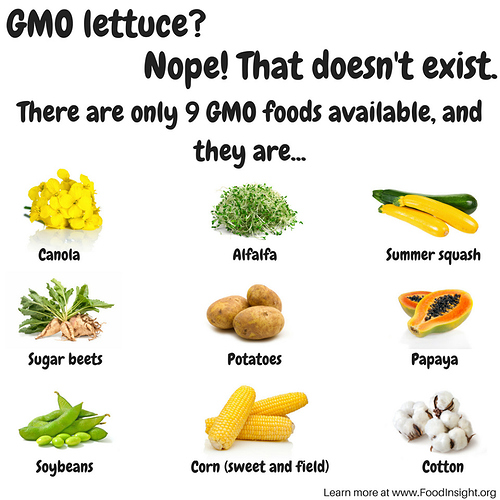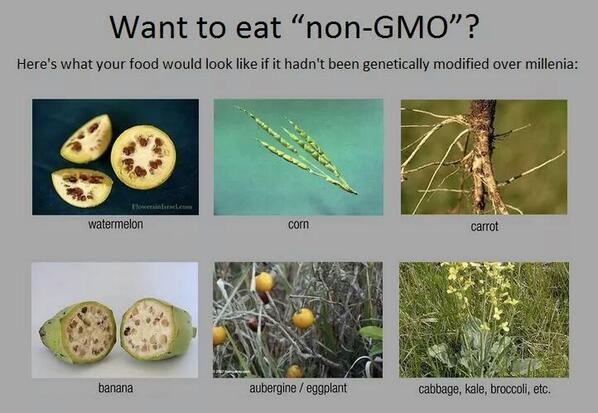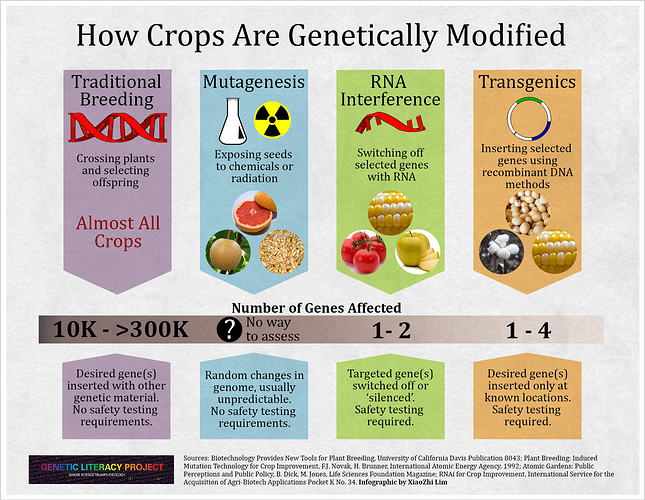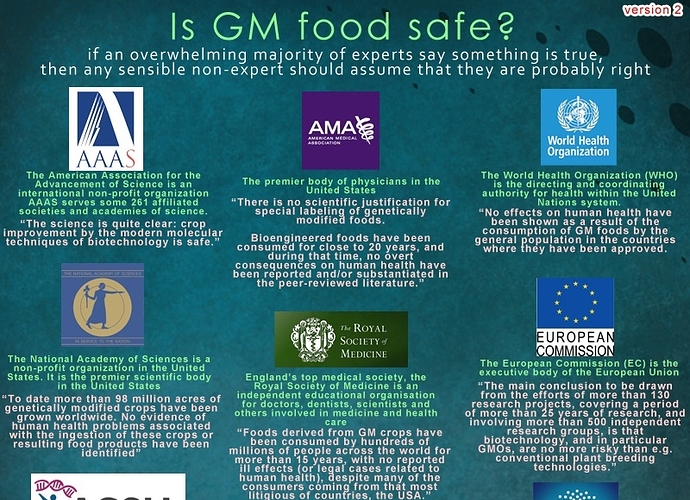GMO hype
Get out of here with your “real information”!
I would add carrots to the list too, they were all purple until we bred them to be orange and sweet a few hundred years ago.
Between this and anti-vaxxers a lot of people seem to be trying pretty hard to bring back the wonderful dark ages, good ol’ disease and famine everywhere.
Hey I think you misinterpreted my message. I’m against the GMO hype. I’m a farmer and see the benefits. My point was that just because it’s labeled non GMO, doesn’t make it better or healthier.
Breeders have been selectively breeding plants and animals to fit consumer demands for a millennial. Science just developed a way to speed up the process. Yes it may seem a bit Frankensteinish…Doesn’t mean it’s unsafe.
It’s not even Frankensteinish, so to speak. It’s more like playing Legos when you step back and look at it.
This topic really ruffles my feathers actually. There was a huge push for farmers to reduce pesticide use. Reducing pesticides = more pests = more crop damage = less aesthetic appearing food/ more waste = higher costs = pissed off consumers / less demand.
GMOs have particularly allowed for a huge decrease in insecticide (the most toxic form of pesticides to human and animals) usage.
Yes, tone is so difficult to detect in correspondance among strangers.
It’s all good. KCKO!
Yeah…I actually understood you were joking. But, potential is easy for many messages to misunderstood. Sometimes I use the  “wink” emoji in case the message gets misinterpreted.
“wink” emoji in case the message gets misinterpreted.
Have to politely disagree with you on this subject. Have another look at your picture and you see that it contains about 95 percent of what appears in our food system as either direct or indirect inputs. Among the chief violators is Dwarf Wheat, Corn and Soy. We eat it, drink it, feed it to our livestock, and transform the landscape into a giant monoculture that saps and depletes soil, provides a vehicle for toxic runoff, and even indirectly kills off bees. You many see improvement in yield in the short term, but how about all the resistant versions of weeds and insects we are starting to see. There’s even a new pesticide resistant version of the corn worm now. How much more toxic do we need to make the environment to combat them? At what point is it too toxic for us to eat the food we grow. I mean if you look at sugar the same way, it took decades for the dose to destroy the health of the human population. You honestly think that companies that deal in terms of yield give a wet slap about the long term effects that genetic modification may have on future generations? Hell, even if it were just a case of yield, look at what that has done to the worlds diet. I also have a farm, and I know that the food we buy at the grocery store is WAY too cheap. For example, if you want to raise chickens and produce eggs that offer decent nutrient value and don’t require torturing animals in the process, you are looking at 4-6 dollars a dozen.
I’m sorry that the hippies are upsetting you, but there may come a day when you just might need to thank them for keeping Bayer, Monsanto and ConAgra from wrecking our health and our environment. I am pro farm and farmer. We need to return farming to its place as the most important and noble occupation around and start working with nature rather than against it. Just to be clear, I am NOT against efficiency. I AM against methods that borrow from the future to pay for the present.
Without selective breading we wouldn’t have spinach, cauliflower, broccoli, brussel sprouts, kale, as these are all derived from the same plant…
I wish people would be clear with their terminology. It may be ambiguous, but in common parlance the term GMO refers to the alteration of DNA by artificial means.
It’s so irritating to read the “argument” that “we’ve been genetically modifying plants for thousands of years”. No, we’ve been breeding plants for thousands of years, and we have agreed to reserve the term GMO for plants created in the lab.
Selective breeding generally alters DNA by artificial means, thereby producing crosses and populations that are not seen in nature. Virtually none of the food we eat today occurs in nature without the manipulation of the underlying DNA by not-found-in-nature (eg, artificial) means. So, the original point stands.
I think what you’re referring to is the molecular-level direct manipulation of gene sequences. While the technology is new and expands the palette of what can be done that does not per se make it morally different or less safe than more traditional, but still artificial, methods of gene manipulation. There might be safety issues, but they need to be discussed in and of themselves rather than ascribing them to “artificiality”.
I agree with the points about terminology. GMO is generally too broad a term, and probably shouldn’t be the main target of any concern. As @DBatting’s post shows, there are several very different forms of GMO.
I don’t believe many people have a problem with the first type (Traditional Breeding). I’ve heard at least favorable things about the last two types (RNA Interference and Transgenics), though it kinda comes down to the end goals of those doing it. I believe those two are also what “Genetically Engineered” usually refers to more specifically.
The second, Mutagenesis, seems to be the most reasonably suspicious one, as it’s the least controlled. I’m not in the field, so take it as you will, but I’ve heard that one of the marketing points in favor of Mutagenesis is companies can claim to not have “Genetically Engineered” food when they do it, which is accurate, but actual Genetic Engineering would be safer as the changes are more precise, better understood and known and have safety testing. With Mutagenesis, it’s hard to say what all happened beyond the most obvious changes. This has certainly been used with very good intentions, and may in some situations have been harmless/overall beneficial, it just may have also yielded some harmful effects in some instances as well (hard to say without further research really). That’s the one Dr. William Davis, the author of Wheat Belly seems most suspicious of anyway and has speculated changed many of the proteins in common wheat to something overall harmful to humans, even if the process also allowed for greater yields. Is he the best source? Meh, you can decide that one. I’m just throwing it in the conversation.
Hot off the press (so to speak) today from your friend Farm Babe aka Michelle Miller, farmer.
Farm Babe: Top 8 myths about GMOs debunked
By Michelle Miller, Farm Babe // http://www.farmbabe.org/ // Published: February 07, 2017
GMOs are now planted in 28 countries and on 444 million acres around the world. But why?
Of course, there is a lot of misinformation on the Internet with many different topics in life. Thanks to many lobbyist groups, the topic of GMOs has become riddled with misinformation that stems vastly from people who’ve never farmed a day in their life. So why listen to the people who don’t have firsthand knowledge over actual farmers themselves? That would be like going to your auto mechanic to clean your teeth, or asking a medical doctor to fix the engine in your car! Everyone has a specialty in life, and it’s important to connect with those of us who devote our entire lives and careers to this. On our farm we grow several different types of crops, which do include GMO corn and soybeans. If 90 percent to 95 percent of certain crop farmers are choosing to grow GMOs, there must be a reason for it, which brings me to my first point:
Continue at the link below:
Funny you mention that. I just read an article earlier (went down the rabbit hole on Michelle Miller’s site) about wheat, corn and soy. She made a few good points that sound like the other side of the coin, so to speak:
Have you ever wondered what life would be like if we didn’t have GMOs?
Imagine what would happen if Monsanto Company, DuPont Pioneer, Syngenta, Bayer CropScience, Dow AgroSciences LLC, etc banned together and stripped us away from this technology. I’d bet at least 2 Billion people would be dead. Grocery bills would be substantially more expensive. More of us would be wondering where our next meal is coming from…just like they sometimes do in third world countries that don’t have access to good Agricultural infrastructure and technology.
But it doesn’t just stop at Food. Products we use EVERY DAY are agricultural biproducts which many of us take for granted.
GMO cotton is used to produce clothing, towels, cash money, sheets, tampons, linens, coffee filters, tents, books, band-aids, x-rays, etc.
GMO Soybeans are used to make toilet seats, candles, crayons, inks, lubricants, hydraulic fluid, etc.
GMO Corn is used for tires, ethanol fuel, dry ice, shampoo, wallpaper, plastics, cleaners, diapers, makeup, paint, fireworks, chalk, paper cups, etc. There are over 4,000 uses for corn!
Click here to learn more about the biproducts from animals fed GMO feed: https://www.facebook.com/IowaFarmBabe/photos/pb.1491945694421203.-2207520000.1456864891./1660804797535291/?type=3&theater
When crops are engineered to produce higher yields and require less water and pesticides to grow, Farmers like to take advantage of this technology. About 90% of our nations farmers choose to grow them because when the benefits help us, they ultimately help YOU! By keeping your food, fuel, fiber, and necesseties affordable. It’s not uncommon for corn yields today to be well over 200 bushels per acre, while in the 1930’s, the average acre produced about 25 bushels. Ag technology helps to prevent deforestation to help a growing planet.
Perhaps it is time to look around us and be thankful! If you ate, drove, showered, got dressed, used a toilet, slept, you have modern Agricultural technology to thank. If you have any questions about GMOs, ask a farmer! Thank you.
Source: http://www.farmbabe.org/single-post/2016/03/01/GMOs-are-way-more-than-just-food
The GMO scientific consensus – it’s unequivocal and overwhelming
Jan 31, 2017 4:40pm EST by SkepticalRaptor // DailyKOS
I have been writing about the GMO scientific consensus for quite some time, because this scientific consensus for the safety of GMO crops is so overwhelming that it’s almost impossible to ignore. Let me put it this way – if you accept the enormous evidence that supports the scientific theory of climate change, then you should know that there is almost the same volume of evidence that supports the safety of genetically modified foods.
If you accept the science of climate change, but deny the science of GMOs, then you are a science denier. It’s pretty simple. In fact, many of us think that GMO deniers are the left’s version of climate change deniers.
The scientific consensus is based only on evidence. Not politics. Not your snowflake opinion. And certainly not on your cherry picked junk science. The scientific consensus is the collective opinion and judgement of scientists in a particular field of study. This consensus implies general agreement, and if there is disagreement, it is limited and generally insignificant.
Moreover, a consensus is not permanent, because, as I’ve said a number of times, science is not a dogma. If contradictory evidence arises, of the same quality that formed the original consensus, then the established concord could fall apart, or move to a different one. Remember, all science is provisional – if the evidence changes, the consensus changes.
So, the GMO scientific consensus is based on mountains and mountains of evidence, reviewed by the best scientific bodies in the world. These are the world’s leading scientists, individuals with expertise in agriculture, genetics, biotechnology, and other related fields, who have come together to review that data, and, eventually come to a consensus that appeals to the broadest swath of scientists.
Of course, I’ve written about the GMO scientific consensus many times. Reading comments to those articles are always amusing. In the past, I generally relied on a couple of august scientific bodies for this consensus, but I always get the comment, “yeah but they’re bought off by Monsanto, it only represents a couple of countries,” or any number of other logical fallacies. Thanks to an exhaustive list produced by the Credible Hulk, it’s time to review all of the world’s science organizations’ statements on the GMO scientific consensus. Spoiler alert – there is no consensus that will state GMOs are evil, dangerous, or cause us to fall over dead because corn is growing out of our brain.
Just to be perfectly clear, the term GMO also encompasses other terms like genetically engineered or genetically modified foods. There are no differences between these various terms for these foods. Furthermore, the scientific consensus includes two separate, but related claims:
- All GMO crops, that were developed using modern genetic engineering processes and that are approved for commercial use by national regulatory bodies, are as safe to consume and as safe for the environment as the corresponding non-GMO counterparts.
- Modern genetic engineering would be no more likely to cause unpredicted dangers than would other methods of changing an organism’s genome (for example, selective breeding, radiation mutagenesis, polyploidy or wide cross hybridization) which have been employed in agriculture for over 10,000 years. And we simply reject the naturalistic fallacy, which some use to claim that “natural” changes to the genome are inherently “better” than genetic engineering.
[snipped for length. Full article containing citations, studies galore and allllllll the science at the link below.]
The TL;DR version
The international GMO scientific consensus is overwhelming – GMO crops are safe for humans, animals and for the environment. You may have an opinion that GMO crops aren’t safe for you, but it would be an unfounded, uninformed, and unrealistic opinion. The scientific evidence, backed up by thousands of publications, is enormous.
I know that there will be comments that say “but Monsanto!!!” Or, “Round Up kills” (well, it doesn’t, but it also has absolutely nothing to do with genetically modified crops). Or you will cherry pick some obscure study in a bad journal or some pseudoscience website to “prove” GMOs destroy human health.
If you want to dispute the safety of GMOs, avoid all logical fallacies. And then get your PhD in biotechnology. And then do some primary research, have it published, and then start a discussion that in some mysterious and heretofore unknown manner, GMO crops somehow harm something. Of course, you’d be in line for a Nobel Prize if you did. Because there’s no convincingly plausible biological mechanism that would lead anyone to presume that genetically modified foods would cause any harm to humans or anything else. None.
But of course, there will be those who will push their unscientific opinion because somehow their knowledge is better than that of thousands of real scientists across the world. But just remember, you are no different than your standard climate change denier.
Source link: http://m.dailykos.com/story/2017/1/31/1628152/-The-GMO-scientific-consensus-it-s-unequivocal-and-overwhelming





